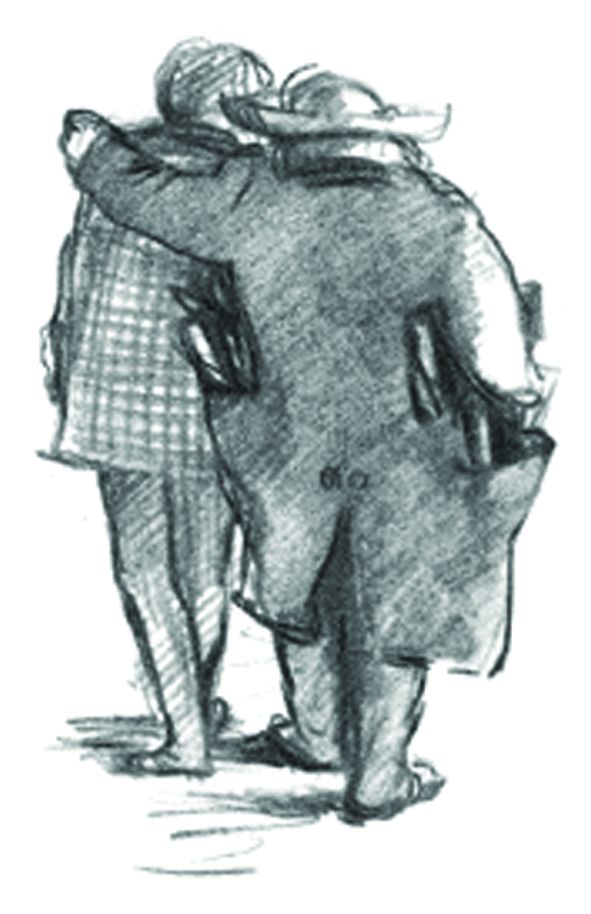Via de Boheme

HowThe Bohemian Club Was Formed – part 22 (of 24). The story so far … homeless artist and musician Alexandre Schaunard has been traipsing the streets of Paris, looking for a change of fortune. He meets a philosopher, Gustave Colline, and later two gentlemen, M. Mouton and M. Rodolphe. Schaunard, forgetting he is homeless, invites everyone back to his lodgings, only to discover Marcel, the new tenant, in occupation. After much confusion they share dinner with Marcel who, next morning invites his new friends to lunch. Now read on …
At the end of luncheon, Rodolphe rose to speak. ‘Gentlemen,’ he said, ‘I must ask permission to leave you….’
‘Ah, no,’ said Schaunard sentimentally, ‘let us never part.’
‘No, indeed, it’s very nice here,’ said Colline.
‘…to leave you for a brief while,’ Rodolphe proceeded. ‘Tomorrow appears The Scarf of Iris, a journal of fashions of which I am chief editor. I must correct my proofs. I shall be back in an hour.’
‘Confound it,’ said Colline, ‘that reminds me that I have to give a lesson to an Indian prince who has come to Paris to learn Arabic.’
‘You can go tomorrow,’ said Marcel.
‘No, because the prince pays me today. Besides, I must confess to you that this beautiful day would be spoilt for me unless I went for a little tour of the book market.’
‘But you’ll return?’ asked Schaunard.
‘With the speed of a javelin hurled by a sure hand,’ said the philosopher, who was fond of eccentric images. He left with Rodolphe.
‘As a matter of fact,’ said Schaunard, left alone with Marcel, ‘instead of loafing on the pillow of far niente, perhaps I should go in search of wealth to appease the cupidity of monsieur Bernard.’
‘But are you still intending to move out?’ said Marcel anxiously.
‘By Jove, I have to. I’ve been turned out by the bailiff, cost five francs.’
‘But, if you move out, will you take away your furniture?’
‘That’s what I intend. “I shall not leave a single hair,” as monsieur Bernard would say.’
‘The deuce! That will be awkward for me,’ said Marcel. ‘I’ve taken your room furnished.’
‘Of course, so you have,’ said Schaunard. ‘Ah, well, anyway,’ he added gloomily, ‘there’s nothing to prove that I shall find my seventy-five francs today, or tomorrow, or any day.’
‘Listen, I have an idea.’
‘Out with it.’
‘The situation is like this: legally this lodging is mine, since I have paid a month in advance.’
‘The lodging, yes, but the furniture – if I pay up, I shall legally remove it. If it were possible, I would even remove it extra-legally.’
‘In short,’ Marcel went on, ‘you have furniture and no lodging, and I have a lodging and no furniture.’
‘Quite so.’
‘For my part, I like this lodging.’
‘So do I: never more than now.’
‘Well, we can arrange the matter. Stay here with me. I provide the lodging, and you provide the furniture.’
‘And the rent?’
‘At present I have the money: I shall pay. Next time it will be your turn. Think it over.’
‘I never think things over – especially not a proposal that appeals to me. I accept at once. It’s a fact that painting and music are sisters.’
‘Sisters-in-law.’
[To be continued]
Vie de Bohème by Henry Mürger, a vivid portrait of the ‘Bohemian’ life of the artistic quarter of Paris in the nineteenth century, was originally published (by Michel Lévy) in 1851. The extract above is taken from a translation by Norman Cameron, published by Hamish Hamilton. The illustration is by Dodie Masterman.
Leave a Response
You must be logged in to post a comment.

